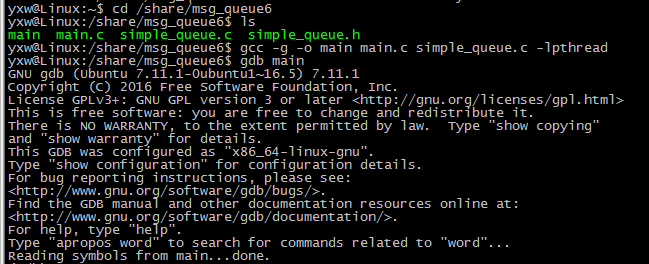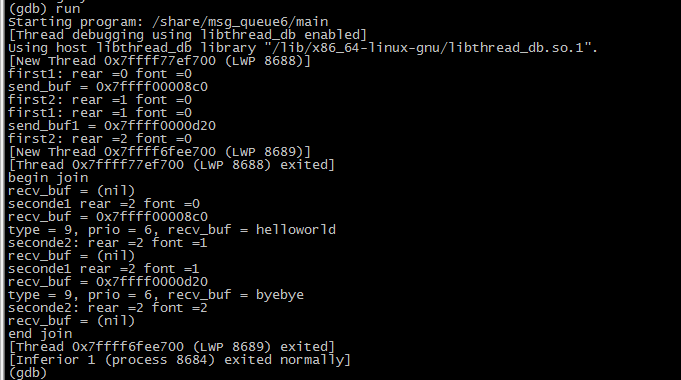用c实现一个阻塞的消息队列
2018-01-10 10:44
609 查看
该消息队列的实现,完全是符合posix标准。
实现了
1.读时,队列空,会阻塞
2.写时,队列满,会阻塞
为了保证线程安全,采用了互斥量,为了阻塞一定时间,采用了条
4000
件变量,二者一起用,实现了一个简单消息队列
simple_queue.c
simple_queue.h
main.c
在linux下面编译

再运行

望大神指教
实现了
1.读时,队列空,会阻塞
2.写时,队列满,会阻塞
为了保证线程安全,采用了互斥量,为了阻塞一定时间,采用了条
4000
件变量,二者一起用,实现了一个简单消息队列
simple_queue.c
#include<stdio.h>
#include<stdlib.h>
#include<string.h>
#include<pthread.h>
#include<sys/time.h>
#include"simple_queue.h"
pthread_cond_t msg_cond = PTHREAD_COND_INITIALIZER;
simple_queue* create_simple_queue(const char* queue_name, int queue_length, int queue_type)
{
simple_queue *this = NULL;
if (NULL == queue_name || 0 == queue_length)
{
printf("[%s] param is error\n", __FUNCTION__);
return NULL;
}
this = (simple_queue*)malloc(sizeof(simple_queue) + queue_length * sizeof(void*));
if (NULL != this)
{
this->front = 0;
this->rear = 0;
this->length = queue_length;
this->queue_type = queue_type;
if (0 != pthread_mutex_init(&(this->data_mutex), NULL))
{
printf("[%s]pthread_mutex_init failed!\n", __FUNCTION__);
free(this);
this = NULL;
return NULL;
}
strcpy(this->queue_name, queue_name);
}
else
{
printf("[%s]malloc is failed!\n", __FUNCTION__);
return NULL;
}
return this;
}
/*
*/
queue_status is_full_queue(simple_queue* p_queue)
{
queue_status ret = QUEUE_IS_NORMAL;
do
{
if (NULL == p_queue)
{
printf("[%s] param is error\n", __FUNCTION__);
ret = QUEUE_NO_EXIST;
break;
}
if (p_queue->front == ((p_queue->rear + 1) % (p_queue->length)))
{
printf("[%s] queue is full\n", __FUNCTION__);
ret = QUEUE_IS_FULL;
break;
}
}while(0);
return ret;
}
/*
*/
queue_status is_empty_queue(simple_queue* p_queue)
{
queue_status ret = QUEUE_IS_NORMAL;
do
{
if (NULL == p_queue)
{
printf("[%s] param is error\n", __FUNCTION__);
ret = QUEUE_NO_EXIST;;
break;
}
if (p_queue->front == p_queue->rear)
{
printf("[%s] queue is empty\n", __FUNCTION__);
ret = QUEUE_IS_EMPTY;
break;
}
}while(0);
return ret;
}
/*
*/
cntl_queue_ret push_simple_queue(simple_queue* p_queue, void* data)
{
int w_cursor = 0;
if(NULL == p_queue || NULL == data)
{
printf("[%s] param is error\n", __FUNCTION__);
return CNTL_QUEUE_PARAM_ERROR;
}
pthread_mutex_lock(&(p_queue->data_mutex));
w_cursor = (p_queue->rear + 1)%p_queue->length;
if (w_cursor == p_queue->front)
{
struct timeval now;
struct timespec tsp;
gettimeofday(&now, NULL);
tsp.tv_sec = now.tv_sec + 5;
tsp.tv_nsec = now.tv_usec * 1000;
if (0 != pthread_cond_timedwait(&msg_cond, &(p_queue->data_mutex), &tsp))//队列满,等待消息被抛出,如果5秒内,没有消息被抛出,就返回
{
printf("[%s]: queue is full\n", __FUNCTION__);
pthread_mutex_unlock(&(p_queue->data_mutex));
return CNTL_QUEUE_TIMEOUT;
}
w_cursor = (p_queue->rear + 1)%p_queue->length;
}
p_queue->data[p_queue->rear] = data;
p_queue->rear = w_cursor;
pthread_mutex_unlock(&(p_queue->data_mutex));
pthread_cond_signal(&msg_cond);
//pthread_cond_broadcast(&msg_cond);
return CNTL_QUEUE_SUCCESS;
}
/*
*/
cntl_queue_ret pop_simple_queue(simple_queue* p_queue, void** data)
{
if(NULL == p_queue)
{
printf("[%s] param is error\n", __FUNCTION__);
return CNTL_QUEUE_PARAM_ERROR;
}
pthread_mutex_lock(&(p_queue->data_mutex));
if (p_queue->front == p_queue->rear)
{
struct timeval now;
struct timespec tsp;
gettimeofday(&now, NULL);
tsp.tv_sec = now.tv_sec + 5;
tsp.tv_nsec = now.tv_usec * 1000;
if (0 != pthread_cond_timedwait(&msg_cond, &(p_queue->data_mutex), &tsp))//队列空,等待消息来临,如果5秒内,没有消息来,就返回
{
printf("[%s]: queue is empty\n", __FUNCTION__);
pthread_mutex_unlock(&(p_queue->data_mutex));
return CNTL_QUEUE_TIMEOUT;
}
}
*data = p_queue->data[p_queue->front];
p_queue->front = (p_queue->front + 1)%p_queue->length;
pthread_mutex_unlock(&(p_queue->data_mutex));
pthread_cond_signal(&msg_cond);
//pthread_cond_broadcast(&msg_cond);
return CNTL_QUEUE_SUCCESS;
}
cntl_queue_ret destroy_simple_queue(simple_queue* p_queue)
{
cntl_queue_ret ret = CNTL_QUEUE_SUCCESS;
if(NULL == p_queue)
{
printf("[%s] param is error\n", __FUNCTION__);
ret = CNTL_QUEUE_PARAM_ERROR;
}
else
{
pthread_mutex_destroy(&(p_queue->data_mutex));
pthread_cond_destroy(&msg_cond);
while (p_queue->front != p_queue->rear)//删除队列中残留的消息
{
free(p_queue->data[p_queue->front]);
p_queue->front = (p_queue->front + 1)%p_queue->length;
}
free(p_queue);
p_queue = NULL;
}
return ret;
}simple_queue.h
#ifndef _SIMPLE_QUEUE_H__
#define _SIMPLE_QUEUE_H__
#define MQ_NAME "test"
#define MQ_FLAG_BLOCK QUEUE_BLOCK
#define MQ_FLAG_NO_BLOCK QUEUE_NO_BLOCK
#define MQ_LENGTH_MAX 10
#define MQ_SIZE_MAX 512
typedef struct _simple_queue
{
int front;
int rear;
int length;
int queue_type;
pthread_mutex_t data_mutex;
char queue_name[15];
void *data[0];
}simple_queue;
typedef struct _simple_queue_buf
{
int msg_type;
int msg_prio;
char msg_buf[50];
//char* msg_buf;
}queue_buf;
typedef enum _queue_type
{
QUEUE_BLOCK = 0,
QUEUE_NO_BLOCK,
}queue_type;
typedef enum _queue_status
{
QUEUE_IS_NORMAL = 0,
QUEUE_NO_EXIST,
QUEUE_IS_FULL,
QUEUE_IS_EMPTY,
}queue_status;
typedef enum _cntl_queue_ret
{
CNTL_QUEUE_SUCCESS = 0,
CNTL_QUEUE_FAIL,
CNTL_QUEUE_TIMEOUT,
CNTL_QUEUE_PARAM_ERROR,
}cntl_queue_ret;
simple_queue* create_simple_queue(const char* queue_name, int queue_length, int queue_type);
queue_status is_full_queue(simple_queue* p_queue);
queue_status is_empty_queue(simple_queue* p_queue);
cntl_queue_ret push_simple_queue(simple_queue* p_queue, void* data);
cntl_queue_ret pop_simple_queue(simple_queue* p_queue, void** data);
cntl_queue_ret destroy_simple_queue(simple_queue* p_queue);
#endifmain.c
#include<stdio.h>
#include<pthread.h>
//#include<errno.h>
#include<string.h>
#include<stdlib.h>
#include"simple_queue.h"
void* send_msg_thread(void* arg)
{
#if 1
queue_buf* send_buf = NULL;
send_buf = (queue_buf*)malloc(sizeof(queue_buf));
send_buf->msg_type = 9;
send_buf->msg_prio = 6;
strcpy(send_buf->msg_buf, "helloworld");
printf("first1: rear =%d font =%d\n", ((simple_queue*)arg)->rear, ((simple_queue*)arg)->front);
printf("send_buf = %p\n", send_buf);
if (push_simple_queue((simple_queue*)arg, (void*)send_buf) < 0)
{
printf("[%s]: push_simple_queue failed!\n", __FUNCTION__);
return NULL;
}
printf("first2: rear =%d font =%d\n", ((simple_queue*)arg)->rear, ((simple_queue*)arg)->front);
#if 1
queue_buf* send_buf1 = NULL;
send_buf1 = (queue_buf*)malloc(sizeof(queue_buf));
send_buf1->msg_type = 9;
send_buf1->msg_prio = 6;
strcpy(send_buf1->msg_buf, "byebye");
printf("first1: rear =%d font =%d\n", ((simple_queue*)arg)->rear, ((simple_queue*)arg)->front);
printf("send_buf1 = %p\n", send_buf1);
if (push_simple_queue((simple_queue*)arg, (void*)send_buf1) < 0)
{
printf("[%s]: push_simple_queue\n", __FUNCTION__);
return NULL;
}
printf("first2: rear =%d font =%d\n", ((simple_queue*)arg)->rear, ((simple_queue*)arg)->front);
#endif
#if 0
queue_buf* recv_buf = NULL;
printf("recv_buf = %p\n", recv_buf);
printf("seconde1 rear =%d font =%d\n", ((simple_queue*)arg)->rear, ((simple_queue*)arg)->front);
if (CNTL_QUEUE_SUCCESS != pop_simple_queue((simple_queue*)arg, (void**)&recv_buf))
{
printf("[%s]: push_simple_queue failed!\n", __FUNCTION__);
return NULL;
}
printf("recv_buf = %p\n", recv_buf);
printf("type = %d, prio = %d, recv_buf = %s\n", recv_buf->msg_type, recv_buf->msg_prio, recv_buf->msg_buf);
printf("seconde2: rear =%d font =%d\n", ((simple_queue*)arg)->rear, ((simple_queue*)arg)->front);
free(recv_buf);
#endif
#endif
return NULL;
}
void* recv_msg_thread(void* arg)
{
#if 1
queue_buf* recv_buf = NULL;
//usleep(500);
printf("recv_buf = %p\n", recv_buf);
printf("seconde1 rear =%d font =%d\n", ((simple_queue*)arg)->rear, ((simple_queue*)arg)->front);
if (CNTL_QUEUE_SUCCESS != pop_simple_queue((simple_queue*)arg, (void**)&recv_buf))
{
printf("[%s]: pop_simple_queue failed!\n", __FUNCTION__);
return NULL;
}
printf("recv_buf = %p\n", recv_buf);
printf("type = %d, prio = %d, recv_buf = %s\n", recv_buf->msg_type, recv_buf->msg_prio, recv_buf->msg_buf);
printf("seconde2: rear =%d font =%d\n", ((simple_queue*)arg)->rear, ((simple_queue*)arg)->front);
free(recv_buf);
recv_buf = NULL;
//queue_buf* recv_buf = NULL;
//usleep(500);
#if 1
printf("recv_buf = %p\n", recv_buf);
printf("seconde1 rear =%d font =%d\n", ((simple_queue*)arg)->rear, ((simple_queue*)arg)->front);
if (CNTL_QUEUE_SUCCESS != pop_simple_queue((simple_queue*)arg, (void**)&recv_buf))
{
printf("[%s]: pop_simple_queue failed!\n", __FUNCTION__);
return NULL;
}
printf("recv_buf = %p\n", recv_buf);
printf("type = %d, prio = %d, recv_buf = %s\n", recv_buf->msg_type, recv_buf->msg_prio, recv_buf->msg_buf);
printf("seconde2: rear =%d font =%d\n", ((simple_queue*)arg)->rear, ((simple_queue*)arg)->front);
free(recv_buf);
recv_buf = NULL;
printf("recv_buf = %p\n", recv_buf);
#endif
#if 0
queue_buf* send_buf1 = NULL;
send_buf1 = (queue_buf*)malloc(sizeof(queue_buf));
send_buf1->msg_type = 9;
send_buf1->msg_prio = 6;
strcpy(send_buf1->msg_buf, "byebye");
printf("first1: rear =%d font =%d\n", ((simple_queue*)arg)->rear, ((simple_queue*)arg)->front);
printf("send_buf1 = %p\n", send_buf1);
if (push_simple_queue((simple_queue*)arg, (void*)send_buf1) < 0)
{
printf("[%s]: push_simple_queue\n", __FUNCTION__);
return NULL;
}
printf("first2: rear =%d font =%d\n", ((simple_queue*)arg)->rear, ((simple_queue*)arg)->front);
#endif
#endif
return NULL;
}
int main(int argc, char* argv[])
{
int ret = 0;
pthread_t send_thread_id = 0;
pthread_t recv_thread_id = 0;
simple_queue* msg_queue = NULL;
#if 1
msg_queue = create_simple_queue(MQ_NAME, MQ_LENGTH_MAX, MQ_FLAG_BLOCK);
#else
msg_queue = create_simple_queue(MQ_NAME, MQ_LENGTH_MAX, MQ_FLAG_NO_BLOCK);
#endif
if (NULL == msg_queue)
{
printf("[%s]: create simple queue failed!\n", __FUNCTION__);
return -1;
}
ret = pthread_create(&send_thread_id, NULL, send_msg_thread, (void*)msg_queue);
if (0 != ret)
{
printf("[%s]: create send thread failed!\n", __FUNCTION__);
return -1;
}
ret = pthread_create(&recv_thread_id, NULL, recv_msg_thread, (void*)msg_queue);
if (0 != ret)
{
printf("[%s]: create recv thread failed!\n", __FUNCTION__);
return -1;
}
printf("begin join\n");
pthread_join(send_thread_id, NULL);
pthread_join(recv_thread_id, NULL);
printf("end join\n");
ret = destroy_simple_queue(msg_queue);
if (CNTL_QUEUE_SUCCESS != ret)
{
printf("[%s]: destroy simple queue failed!\n", __FUNCTION__);
return -1;
}
return 0;
}在linux下面编译

再运行

望大神指教
相关文章推荐
- nodejs一个函数实现消息队列中间件
- 【JAVA】简单实现一个阻塞任务队列
- 一个Redis消息队列实现
- JDK源码分析之主要阻塞队列实现类ArrayBlockingQueue -- java消息队列/java并发编程/阻塞队列
- 用一个消息队列(System V)实现客户端-服务器端
- 消息队列实现从一个进程向另一个进程发送一个数据块的方法
- 用redis阻塞队列,实现消息传递
- Java编程的逻辑 (61) - 内存映射文件及其应用 - 实现一个简单的消息队列
- 一个简单的阻塞队列实现
- 使用 ReentrantLock 和 Condition 实现一个阻塞队列
- 12-2-多condition实现可阻塞消息队列
- 利用主线程与子线程间的消息通讯,实现任务处理队列.子线程中创建不会阻塞执行的窗口
- javaweb简单实现前台请求的非阻塞消息队列(ConcurrentLinkedQueue)
- 一个消息队列类的实现C++
- 聊聊高并发(十四)理解Java中的管程,条件队列,Condition以及实现一个阻塞队列
- 基于Redis实现分布式消息队列
- 使用两个队列实现一个栈
- 分享一个c#写的开源分布式消息队列equeue
- 通过消息队列实现两进程间通信
- 两个队列实现一个栈
